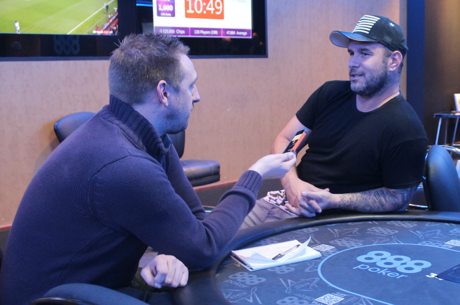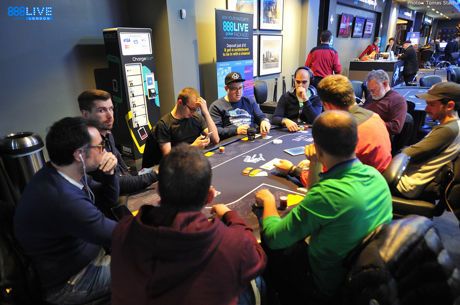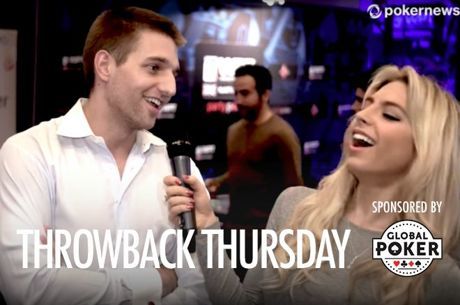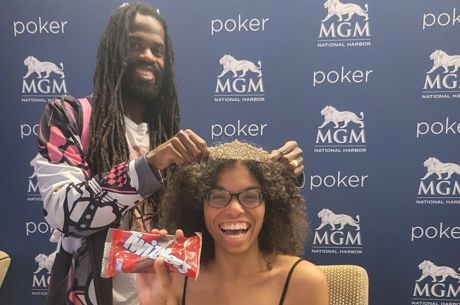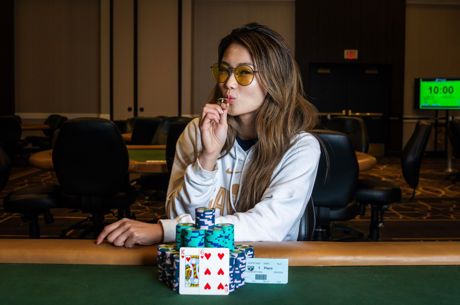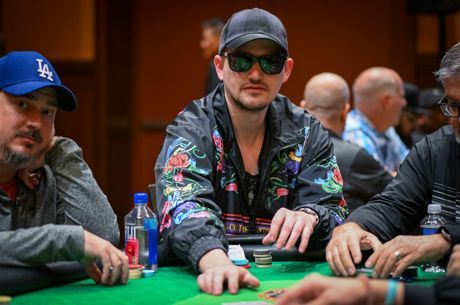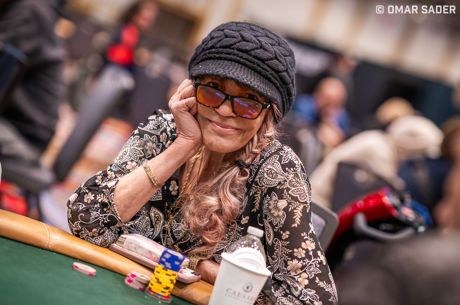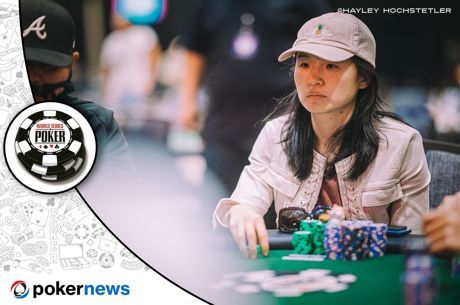Before the Game: Steve Watts the Professional Football Player
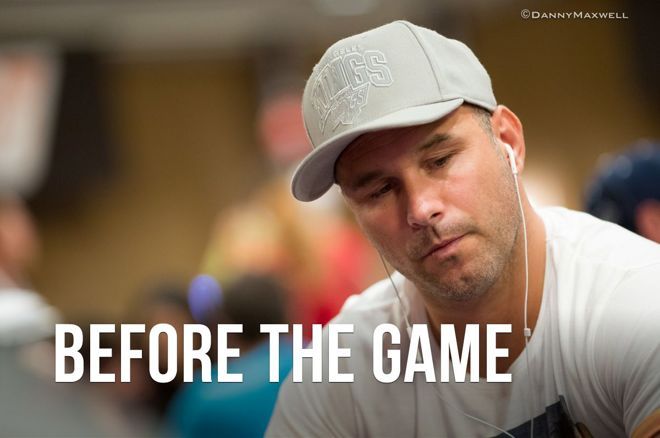
Steve Watts has become one of Britain��s most popular and successful poker players in recent years. With a sparkling personality, the man who has run deep in the WSOP Main Event and won just short of a million dollars on the live circuit is well-known as a man who knows how to finish at the felt. But before poker, Watts was a finisher of a different kind, scoring hundreds of goals as a professional soccer player.
A small boy became Steve Watts, the big man who fulfilled his family��s dreams... Before the Game.
��I started playing football over the park with my mates. But I wasn��t that interested in it until I joined a team called Tulse Hill when I was about eight or nine. I started playing every Sunday. I never took it seriously; I just enjoyed it. I scored loads of goals and got picked up by Millwall.��
"Strategy and analyzing situations very quickly are two big skills I learned."
Being taken in at a professional club isn��t as simple as knowing you��ve made it and being offered a contract. Watts was put into the South London side��s development team.
��They put you into training. Then, if they think you��re good, they put you in a couple of games. If you do well, they keep you on for another couple of months, if not; they let you go. It��s a conveyor belt, but I lasted two years there.��
At the age of 12, Watts was told he was too small, with other boys growing bigger and stronger by the day.
��I was a bit little, but I had a lot of skill. They could run faster than me. Technically, I was as good as them, but my birthday was July, I missed out on the next year at school by 20 days. Not only was I small for my age, but I was also a year younger as well. It definitely hampered me because there were boys born in January who had seven months on me. It was like playing under 15s against under 17s because they��d developed so much more.��
Having committed two years of his young life to Millwall, he had to leave, and it hit the future WPT Marbella champion hard. It was only the beginning of rejections.
��It was a bit gutting. I started supporting Millwall, getting tickets every week and going down to The Den. I was out of a professional team for a year. I played for my district then I got picked up by Tottenham Hotspur and was there for about a year. When I got released by Tottenham, there was a gap. I went on a Youth Training Scheme at Charlton, but it was the same sort of thing. I had to go the non-league route. I played for Dulwich Hamlet until I grew.��
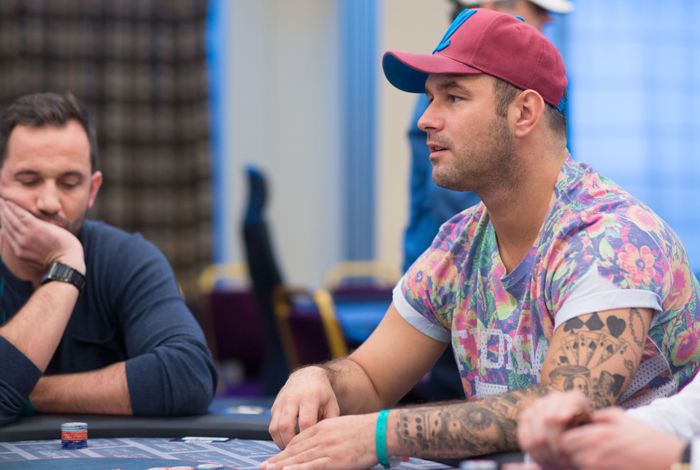
A tall, skinny kid, Watts began to fill out, a little like his big brother Danny, who tragically lost his life earlier this year after a glittering career first as a boxer, then as David Haye��s right-hand man through his heavyweight boxing career. To this day, it��s always a boxing match which will draw Watts�� eye.
��My Dad did some unlicensed fighting back in the day; he had three or four fights. My brother and I both went to a Boxing Club when we were younger. I chose football, and he chose boxing. My brother was in the army, became ABA champion a couple of times, and ended up turning pro but he had something wrong with his heart before he had to give up. I had nine fights and eight wins when I was younger. Boxing is my favorite sport now. You give me a big fight or a big football match now and 100% I��ll watch the big fight. I love boxing.��
The younger Watts chose football, and an injury when he was still a teenager sent him to the gym. It would be the break he needed.
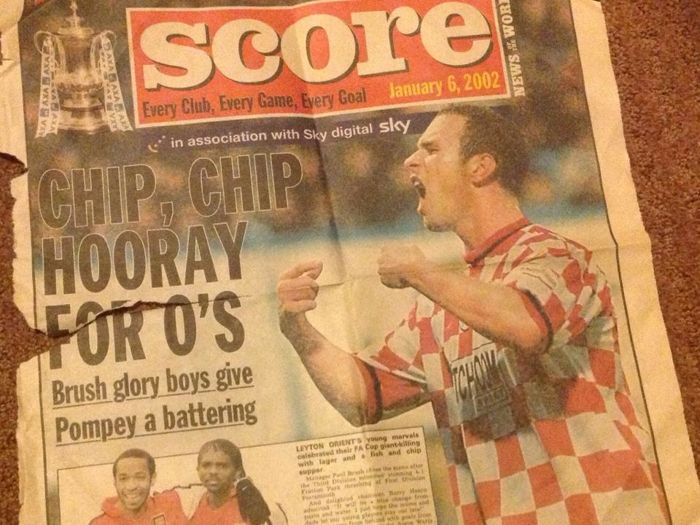
��My technical side was always good, but it took me until I was about nineteen and an injury to my medial ligaments to make it. I was out for a year and spent it in the gym doing weights. When I came back from that, I started playing for Dulwich Hamlet reserves and scoring lots of goals. Then Fisher Athletic took me for their first team. I started playing men��s football. I got 37 goals the first season. A lot of clubs were interested in me, including Millwall and Leyton Orient. We played Cambridge, who Neil Harris was playing for, and there were so many scouts there because he��d been on trial with Liverpool. We both had the same amount of goals going into the game and that night; he scored four and I scored three. They won 4-3. He ended up going to Millwall, and I went to Leyton Orient. Obviously, I��d have loved to play for Millwall. But I played for Leyton Orient, who were my Grandads club, which made him proud. At Fisher Athletic, I was playing in front of 300 people. Three months later, at the end of that season, I played in front of 44,000 at Wembley and sang the national anthem looking up at the stars. I thought ��This is ridiculous.��
Despite reaching the playoff final in his first season, it turned out to be heartbreak for Watts and his teammates. That sorrow was even worse the following season.
��We lost to Scunthorpe in the playoffs that year. I missed a chance when it cut back to me. I caught it pretty well, but they cleared it off the line. They��d scored pretty early, and we lost 1-0. They went up, and the next time we got to the big final, I��d scored the goal to get us there. But this time, we got to the playoff final against Blackpool, and I couldn��t play because I��d been sent off in the Hull game for clattering into a big bully who was a bouncer. Everyone was scared of him, and he punched me off the ball. The ball came loose, and I just two-footed him and got sent off. During the season, if you ever got sent off, you��d play the next game then get the next three off. But in the playoffs, it doesn��t work like that, so I missed the final.��
"You need to have the adrenaline, and you get that by playing poker for millions."
Without Watts, Orient lost again, and despite going on to the Millennium Stadium pitch, Watts had to sit in the stands as his team was beaten 3-1. His manager, Tommy Taylor, left the club and his replacement, Paul Brush, proved the new broom who wanted to sweep out some players and build a new team.
��I was top scorer at the time, and he told me that Cardiff and Swansea and Shrewsbury had come in for me. Shrewsbury had just beaten Everton and knocked them out of the F.A. Cup. I got away from London, but they ended up being relegated, and I had a three-year deal.��
So far from home, Watts decided to return to non-league football in the capital and eventually ended up back at Fisher Athletic, his old team. But there, he endured a spate of injuries that would force him out of the game.
��I joined my old club Fisher Athletic. We were all really good mates who were getting good money and playing total football. But my knee would swell up if I played the whole game. I kept getting injured and couldn��t train full time. I couldn��t get the weight off, playing a stone heavier than I wanted to. I��d turn up and play on the Saturday, ice it, and hopefully play on the Tuesday. But I couldn��t train on the Thursday because I didn��t want to ruin it for Saturday. I had about six cartilage operations on one knee. I couldn��t straighten it, and it would swell up after 25 minutes. Then my other knee went.��
It was around this time that Watts discovered a back-street poker club called Gus��s. Suddenly, the ability to play in front of big crowd, deal with pressure situations and to keep his composure had an outlet that didn��t rely on his knees holding firm.
��The first time I played poker was at a place called Gus��s, which was probably the best poker school ever. In Catford. Praz Bansi, Chaz and Sunny Chattha, Martins Adeniya, and James Akenhead. They used to do a Sit n Go for ��100, and there��d be about 30 people, and we��d play cash games after. You can imagine the talent there. James [Akenhead] went and won a couple of million quid in a year, Bansi and the Chattha��s were winning. I thought if I play with these guys, they��re the best in the UK. You have to be mentally strong to cope with poker.��
Watts took a few shots and ended up heading to Las Vegas, the city of poker dreams. He started winning money, and when football stopped, poker started.
"You have to be mentally strong to cope with poker."
��I love it over there. I feel like I don��t have to go and quickly come back, sometimes I go for five or six weeks for the WSOP. You can relax the first couple of days, get acclimatized, and then you��re playing for big prizes in the biggest events.��
Watts learned the ropes with WSOP bracelet winners like Praz Bansi and owes a lot of his career to those early years he shared with legends of the game like the Chattha brothers and James Akenhead. Two 5th-place finishes in Ireland (in a WPT Main Event and the Irish Open) helped cement Watts�� reputation in 2012, and he��s posted plenty of winning results in the years that have followed. He��s learned which players to take on, just like he did on the football pitch.
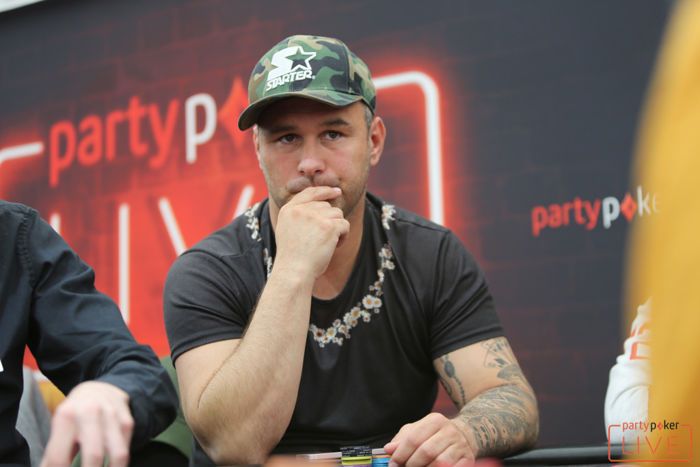
��There was a time where I��d go up against the great players, like Sam Grafton. I learned that you want to stay away from those players, they��re good players. You take on the old guys, ones who are more conservative, who always call and never raise. In football, I��d work out who��s not as good in the air, then pick on the smaller defender at the far post, get my headers.��
When it comes to football, it��s clear that plenty of the skills Watts honed on the pitch now aid him at the felt.
��Strategy and analyzing situations very quickly are two big skills I learned. The hardest players are aggressive players with a hand because you can never put them on anything. That��s why being aggressive pays off so much. People like Ludo [Geilich] and [Chris] Moorman - if they��re five-betting you pre-flop and you��ve got jacks, it��s horrible to play against them.
Although he��s known in England as more of a live player, Watts has had some success online, too.
"It was a bit depressing finishing football because I got that adrenaline boost from being with my team-mates, going out and scoring goals. Poker filled that gap."
��I��ve been playing some cash games on partypoker and PokerStars, $5/$10 and $10/$20 and I��m doing all right, I��m ticking over. No-one knows my aliases nowadays, despite me making the Sunday Million final table twice. I��m not giving up until I��ve won a million dollars in a live tournament. But I��ve won plenty online too; it��s gone very well.��
As a footballer, gambling was a problem for the big man with a heart of gold. He sees poker as a game that stopped him going down a worse route.
��I��d played arcade machines and bet on horses when I was a footballer, in fact, I was quite a bad gambler. It was a different form of gambling with a bit more skill. It��s probably saved me a bit because I��d lose my money all the time betting. Poker got me involved with socializing like it was on the football side. It was a bit depressing finishing football because I got that adrenaline boost from being with my team-mates, going out and scoring goals. Poker filled that gap. Traveling with my mates, having a good time and playing for a big prize pool kept that addiction. You need to have the adrenaline, and you get that by playing poker for millions.��
Steve Watts will always be remembered by British football fans for the excitement he brought them whenever he took to the pitch. As a young kid, he had to battle his way up the divisions to conquer bigger players than him, a little like his older brother and the British poker heroes he would meet and, eventually, emulate. One day, Watts hopes to become the WSOP bracelet you remember as the man who used to score goals for fun... Before the Game.
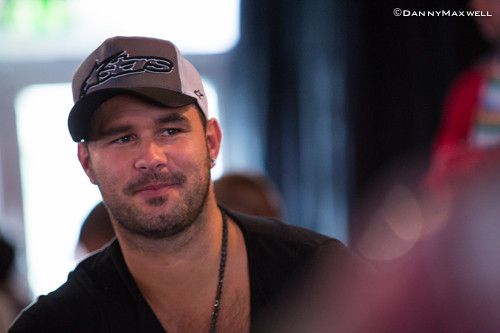
In this Series
- 1 Before the Game: Sam Razavi the Stage Performer
- 2 Before the Game: Steve Watts the Professional Football Player
- 3 Before the Game: Roberto Romanello the Restaurant Worker (Part One)
- 4 Before the Game: Roberto Romanello (Part Two)
- 5 Before the Game: Mike Sexton the Paratrooper (Part One)
- 6 Before the Game: Mike Sexton (Part Two)
- 7 Neil Channing - Before the Game (Part One)
- 8 Neil Channing - Before the Game (Part Two)
- 9 Before the Game: Erik Seidel the Trader (Part One)
- 10 Before the Game: Erik Seidel the Trader (Part Two)
- 11 Before the Game: Sorel Mizzi the Young Army Reservist (Part One)
- 12 Before the Game: Sorel Mizzi the Telemarketer (Part Two)
- 13 Before the Game: Sam Trickett the Footballer (Part One)
- 14 Before the Game: Sam Trickett (Part Two)
- 15 Before the Game: Bryn Kenney the Magic Player (Part One)
- 16 Before the Game: Bryn Kenney (Part Two)
- 17 Before the Game: Toby Lewis the Sports Nut (Part One)
- 18 Before the Game: Toby Lewis the Sports Nut (Part Two)
- 19 Before the Game: Matt Salsberg the TV Writer (Part One)
- 20 Matt Salsberg: Before the Game (Part Two)
- 21 Before the Game: Jeff Gross the College Soccer Star (Part One)
- 22 Before the Game: Jeff Gross (Part Two)
- 23 Before the Game: Martin Jacobson the Chef (Part One)
- 24 Before the Game: Martin Jacobson the Chef (Part Two)
- 25 Before the Game: Scott Davies the Lawyer
- 26 Before the Game: Chris Moorman the Business Student (Part One)
- 27 Before the Game: Chris Moorman The College Dropout (Part Two)
- 28 Before the Game: Padraig Parkinson the Carnival Host (Part One)
- 29 Before the Game: Padraig Parkinson the Carnival Host (Part Two)

